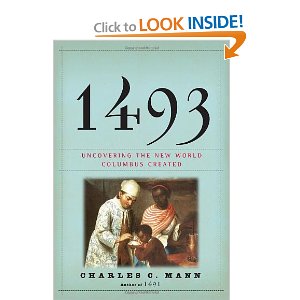1493: Uncovering the New World Columbus Created, by Charles C. Mann
Did the introduction of malaria in America pave the way for the African slave trade? Did the discovery of silver in Bolivia lead to ecological disaster in China? Is what we call globalization really more about biological exchange than economic exchange?
These are some of the topics Charles C. Mann discusses in his book 1493: Uncovering the New World Columbus Created. It’s a meticulously researched book that weaves history, biology, economics, and cultural studies into a look at the various impacts that the New World had on the entire world. The core message of the book is that the result of Europe and Asia meeting the America’s is largely positive, but the balanced take that Mann promotes is that we must recognize the damage done as well. Especially in the area of economic injustice or environmental changes.
Don’t let the title deceive you; this book is not so much about Columbus (though he is definitely featured in the early part of the book) and more about Columbus as an emblem of Europe colonizing America. That shift — a massive and hugely important one in any sense — is what the book is about. Columbus’ journey in 1492 was the first step toward globalization and all that it entails.
The book is rightfully on the New York Times Bestseller list and will probably stay there for quite some time. It’s a great book that will be referred to often. I enjoyed the book — in part because the writing is crisp and clear. But I wasn’t as excited about the book the way some reviewers on Amazon are. A lot of the conclusions that Mann reaches seem to be (at least to me) self-evident.
Despite my reservations, this is a definitely a must-read book. If for no other reason than people are going to be talking about it a lot. And Mann presents ideas so well, with such detailed accuracy, that his arguments are among the strongest I’ve read in a long time. So buy it, read it, and enjoy it.

